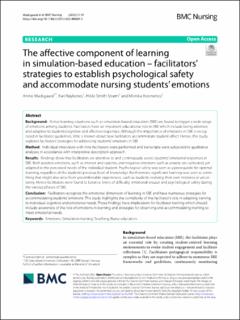| dc.contributor.author | Madsgaard, Anine | |
| dc.contributor.author | Røykenes, Kari | |
| dc.contributor.author | Smith-Strøm, Hilde | |
| dc.contributor.author | Kvernenes, Monika | |
| dc.date.accessioned | 2022-06-07T11:15:53Z | |
| dc.date.available | 2022-06-07T11:15:53Z | |
| dc.date.created | 2022-04-28T12:27:38Z | |
| dc.date.issued | 2022 | |
| dc.identifier.issn | 1472-6955 | |
| dc.identifier.uri | https://hdl.handle.net/11250/2997688 | |
| dc.description.abstract | Background
Active learning situations such as simulation-based education (SBE) are found to trigger a wide range of emotions among students. Facilitators have an important educational role in SBE which include being attentive and adaptive to students’cognitive and affective responses. Although the importance of emotions in SBE is recognized in facilitator guidelines, little is known about how facilitators accommodate student affect. Hence, this study explores facilitators’ strategies for addressing students’ emotions in SBE.
Method
Individual interviews with nine facilitators were performed and transcripts were subjected to qualitative analyses in accordance with interpretive description approach.
Results
Findings show that facilitators are attentive to and continuously assess students’ emotional responses in SBE. Both positive emotions, such as interest and surprise, and negative emotions such as anxiety are cultivated, yet adapted to the perceived needs of the individual student. Psychological safety was seen as a prerequisite for optimal learning, regardless of the students’ previous level of knowledge. Furthermore, significant learning was seen as something that might also arise from uncomfortable experiences, such as students realizing their own mistakes or uncertainty. Hence facilitators were found to balance levels of difficulty, emotional arousal and psychological safety during the various phases of SBE.
Conclusion
Facilitators recognize the emotional dimension of learning in SBE and have numerous strategies for accommodating students’ emotions. This study highlights the complexity of the facilitator’s role in adapting training to individual cognitive and emotional needs. These findings have implications for facilitator training which should include awareness of the role of emotions in learning and strategies for observing and accommodating training to meet emotional needs. | en_US |
| dc.language.iso | eng | en_US |
| dc.publisher | BioMed Central | en_US |
| dc.rights | Navngivelse 4.0 Internasjonal | * |
| dc.rights.uri | http://creativecommons.org/licenses/by/4.0/deed.no | * |
| dc.title | The affective component of learning in simulation-based education – facilitators’ strategies to establish psychological safety and accommodate nursing students’ emotions | en_US |
| dc.type | Journal article | en_US |
| dc.type | Peer reviewed | en_US |
| dc.description.version | publishedVersion | en_US |
| dc.rights.holder | Copyright 2022 The Author(s) | en_US |
| dc.source.articlenumber | 91 | en_US |
| cristin.ispublished | true | |
| cristin.fulltext | original | |
| cristin.qualitycode | 1 | |
| dc.identifier.doi | 10.1186/s12912-022-00869-3 | |
| dc.identifier.cristin | 2019781 | |
| dc.source.journal | BMC Nursing | en_US |
| dc.identifier.citation | BMC Nursing. 2022, 21 (1), 91. | en_US |
| dc.source.volume | 21 | en_US |
| dc.source.issue | 1 | en_US |

